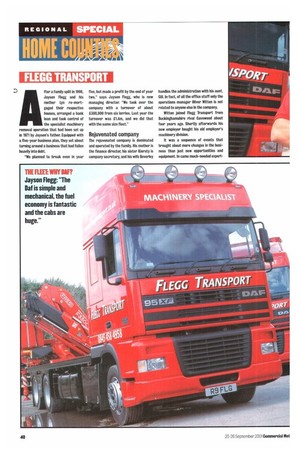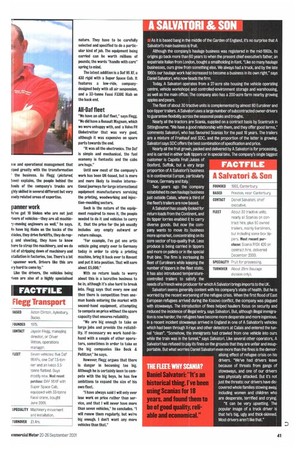FLEGG TRANSPORT
Page 40

Page 41

If you've noticed an error in this article please click here to report it so we can fix it.
.7) fter a family split in 1996, A
Jayson Flegg and his mother Lyn re-mortgaged their respective houses, arranged a bank loan and took control of the specialist machinery removal operation that had been set up in 1971 by Jayson's father. Equipped with a five-year business plan, they set about turning around a business that had fallen heavily into debt.
"We planned to break even in year five, but made a profit by the end of year two," says Jayson Flegg, who is now managing director. We took over the company with a turnover of about £300,000 from six lorries. Last year the turnover was £1.4m, and we did that with the same size fleet."
Rejuvenated company
The rejuvenated company is dominated and operated by the family. His mother is the finance director, his sister Kiersty is company secretary. and his wife Beverley handles the administration with his aunt, Gill. In fact, of all the office staff only the operations manager Oliver Witton is not related to anyone else in the company.
Witton joined Flegg Transport from Buckinghamshire rival Cavewood about four years ago. Shortly afterwards his new employer bought his old employer's machinery division.
It was a sequence of events that brought about more changes in the business than just new opportunities and equipment. In came much-needed experi
ie and operational management that !Iped greatly with the transformation the business. As Flegg (pictured, h we) explains, the people behind the heels of the company's trucks are Oily skilled in several different but very esely related areas of expertise.
panner work Ve've got 10 blokes who are not just i'vers of vehicles—they are all machin,y-moving engineers as well," he says. Ye have big Hiabs on the backs of the 'hides, they drive forklifts, they do ropg and sheeting, they have to know here to strap the machinery, and we do hit of stripping down of machinery and stallation in factories, too, There's a lot ' spanner work. Drivers like this are iry hard to come by."
Like the drivers, the vehicles being ven are also of a highly specialised nature. They have to be carefully selected and specified to do a particular kind of job. The equipment being carried can be worth millions of pounds; the words "handle with care" spring to mind.
The latest addition is a Oaf 95 XF, a 430 rigid with a Super Space Cab. It features a low-ride, companydesigned body with all air suspension, and a 33-tonne Fassi F330C Hiab on the back end.
All-Daf fleet
"We have an all-Oaf fleet." says Flegg. "We did have a Renault Magnum, which we were unhappy with, and a Volvo Ili Globetrotter that was very good, although it was expensive on spare parts towards the end.
It was all the electronics. The Oaf is simple and mechanical, the fuel economy is fantastic and the cabs are huge."
Until now most of the company's work has been UK-based, but is more and more likely to involve international journeys for large international equipment manufacturers servicing the printing, woodworking and injection-moulding sectors.
Such is the nature of the equipment required to move it, the people needed to do it and vehicles to carry it, that the price for the job usually includes any empty outward or return mileage.
"For example, I've got one artic vehicle going empty over to Germany today in order to strip a printing machine, bring it back over to Havant and put it into position. That will earn about £5,000."
With no return loads to worry about this is a lucrative business to be in, although its also hard to break into. Flegg says that every now and then there is competition from oneman bands entering the market with second-hand equipment, attempting to compete on price without the spare capacity that ensures reliability.
"We are big enough to take on large jobs and provide the reliability. If necessary we work hand-inhand with a couple of other operators, sometimes in order to take on the big companies like Beck & Pollitzer," he says.
However, Flegg argues that there is danger in becoming too big. Although he is certainly keen to compete with the big boys, he has few ambitions to expand the size ot his own fleet.
"I have always said I will only ever lose work on price rather than service, and that I will never have more than seven vehicles," he concludes. "I will renew them regularly, but we're big enough. I don't want any more vehicles than that."




































































































































